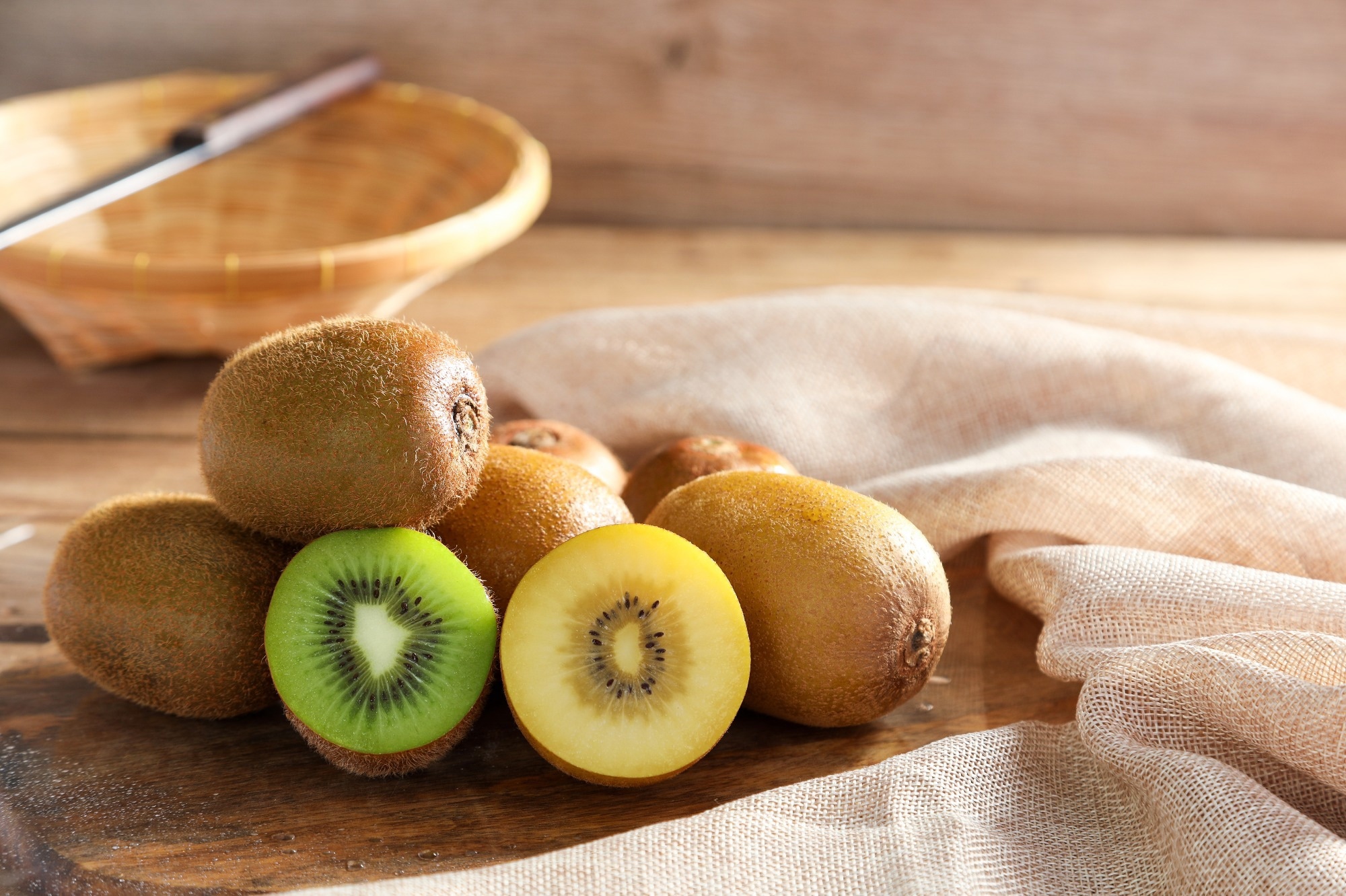In a recent study published in the journal Foods, researchers in New Zealand explore the effects of consuming kiwifruit daily for six weeks on inflammatory and metabolic biomarkers that may reflect long-term disease risk.
 Study: Effects of Daily Ingestion of Two SunGold Kiwifruit for 6 Weeks on Metabolic and Inflammatory Biomarkers: A Randomized, Cross-Over, Exploratory Intervention Study. Image Credit: BirdShutterB / Shutterstock.com
Study: Effects of Daily Ingestion of Two SunGold Kiwifruit for 6 Weeks on Metabolic and Inflammatory Biomarkers: A Randomized, Cross-Over, Exploratory Intervention Study. Image Credit: BirdShutterB / Shutterstock.com
What is kiwifruit?
Kiwifruit, a popular export fruit, contains phytochemicals, dietary fiber, and vitamins that confer various health benefits to individuals. However, the high glucose and fructose content of these fruits may raise the net consumption of these sugars.
Despite epidemiological studies that have reported the reduced risk of all-cause mortality associated with consuming fruit, scientific evidence is needed to elucidate the potential risks of metabolic syndrome or other disorders related to kiwifruit consumption.
About the study
In the present randomized, cross-over, and exploratory study, researchers investigate whether consuming two kiwis daily for six weeks alters inflammatory and metabolic biomarker levels associated with health outcomes over the long term.
The study included 24 healthy individuals who ate two Actinidia chinensis var. chinensis ‘Zesy002’ (SunGold™ Kiwi) daily as the intervention or a no-kiwifruit diet for six weeks. In the cross-over trial, two kiwifruit daily were consumed for six weeks with kiwifruit and no-kiwifruit periods in parallel, with both groups crossing over after a 21-day washout period.
Only healthy males between 25-60 years of age without a history of type 1 or 2 diabetes or glucose intolerance in oral glucose tolerance tests according to the Diabetes New Zealand criteria and a body mass index (BMI) ranging from 20 to 37.5 kg/m were recruited for the study through newspaper and web-based advertisements. The General Health Questionnaire was used to assess the health status.
The Plant and Food Research Institute of New Zealand staff pre-screened the volunteers. Eligible individuals attended their clinics in the morning hours at weeks three, nine, 12, 18, and 21 to provide urine and blood samples for analysis. Anthropometric changes including BMI and waist-hip ratio, as well as serum lipids, short-chain fatty acids (SCFAs), serum glucose, insulin, glycated hemoglobin (HbA1c), uric acid, creatinine, urinary vitamin C, and inflammatory biomarkers levels were assessed.
Vitamin C levels were estimated using ultra-high-performance liquid chromatography-mass spectrometry (UHPLC-MS). Enzyme-linked immunosorbent assays (ELISA) were performed to measure insulin, adiponectin, C-reactive protein (CRP), and serum interleukin 6 (IL-6) levels. Gas chromatography-mass spectrometry (GC-MS) was performed to measure serum SCFA levels.
All measurements were compared pre- and post-intervention. Study participants completed food diaries three days before collecting blood samples to assess dietary fiber and ascorbic acid intakes.
Individuals with fasting blood glucose (FBG) levels exceeding six mmol/liter and HbA1c levels of 41 mmol/mol, those with intolerance to kiwifruit, or individuals diagnosed with any diseases or gastrointestinal disorders were excluded from the study.
Study findings
No significant changes were observed in biomarkers analyzed between or within the interventional and control phases. The effect sizes of kiwifruit intake were not large enough to be statistically significant in the test scenarios, thus indicating that the daily consumption of two kiwifruits is likely to be safe regarding metabolic health.
During the kiwifruit intervention periods, ascorbic acid intakes were higher than those in the control periods for 17 of 20 participants at 256 mg/day as compared to 106 mg/day. The higher mean urinary vitamin C concentrations during the intervention and control periods reflected the increased ascorbic acid intake at 48 mg/day and 32 mg/day, respectively. Kiwifruit consumption did not affect the net serum vitamin C levels nor induce weight gain. Systolic-type blood pressure levels were significantly higher by 3.4% in the intervention group than in the control group toward the completion of the dietary treatment. However, systolic blood pressure did not change substantially before and after the intervention and control periods.
Likewise, kiwifruit consumption did not significantly affect glycemic control, CRP, IL-6, serum lipids, creatinine, adiponectin, or fructose-induced lipogenesis.
Food diary analysis indicated that consuming two kiwifruits daily increased dietary fiber intake for most study participants. Dietary fiber was significantly higher by seven grams each day in the intervention phase than during the control phase using the baseline value as a covariable.
Systematic differences in serum SCFA levels were observed between the interventions. However, these differences were primarily observed between the initial and second interventional periods rather than between the intervention and control phases.
Conclusions
The study findings demonstrate that kiwifruit intake did not significantly improve or deteriorate health, as indicated by inflammatory and metabolic biomarkers. Importantly, consuming two SunGold kiwifruits daily increased ascorbic acid intake by 150 mg/day, thus eliminating the need for vitamin C supplementation requirements.
Conflicts of Interest
Authors Suman Mishra, Kerry Bentley-Hewitt, Tony McGhie, Duncan Hedderley, Sheridan Martell, Hannah Dinan, and John Monro, employed by New Zealand Institute for Plant and Food Research Ltd., and Karl Fraser from AgResearch Limited, Palmerston North, New Zealand, contributed solely for scientific purposes. There was no commercial influence on the research, result analysis, or paper writing. All authors declare no conflicts of interest.
Journal reference:
- Mishra, S., Bentley-Hewitt, K., McGhie, T., et al. (2023). Effects of Daily Ingestion of Two SunGold Kiwifruit for 6 Weeks on Metabolic and Inflammatory Biomarkers: A Randomized, Cross-Over, Exploratory Intervention Study. Foods 12(4236). doi:10.3390/foods12234236

 PARENTING TIPS
PARENTING TIPS PREGNANCY
PREGNANCY BABY CARE
BABY CARE TODDLERS
TODDLERS TEENS
TEENS HEALTH CARE
HEALTH CARE ACTIVITIES & CRAFTS
ACTIVITIES & CRAFTS

